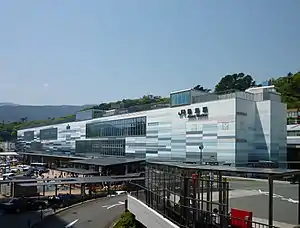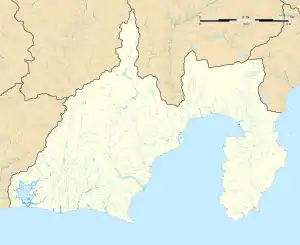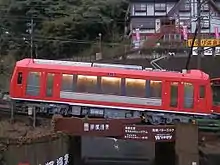Atami Station
Atami Station (熱海駅, Atami-eki) is a railway station in the city of Atami, Shizuoka Prefecture, Japan, jointly operated by East Japan Railway Company (JR East) and Central Japan Railway Company (JR Central).
JT21 CA00 Atami Station 熱海駅 | |||||||||||||||||||||||||||||||||||||||||||||||||||
|---|---|---|---|---|---|---|---|---|---|---|---|---|---|---|---|---|---|---|---|---|---|---|---|---|---|---|---|---|---|---|---|---|---|---|---|---|---|---|---|---|---|---|---|---|---|---|---|---|---|---|---|
 Atami Station in April 2018 | |||||||||||||||||||||||||||||||||||||||||||||||||||
| General information | |||||||||||||||||||||||||||||||||||||||||||||||||||
| Location | Tahara Honchō, Atami-shi, Shizuoka-ken 413-0011 Japan | ||||||||||||||||||||||||||||||||||||||||||||||||||
| Coordinates | 35°06′12″N 139°04′40″E | ||||||||||||||||||||||||||||||||||||||||||||||||||
| Operated by |
| ||||||||||||||||||||||||||||||||||||||||||||||||||
| Line(s) | |||||||||||||||||||||||||||||||||||||||||||||||||||
| Distance | 104.6 km (65.0 mi) from Tokyo | ||||||||||||||||||||||||||||||||||||||||||||||||||
| Platforms | 2 side platforms (Shinkansen) 1 side + 1 island platform (Conventional line) | ||||||||||||||||||||||||||||||||||||||||||||||||||
| Tracks | 7 (2 Shinkansen) | ||||||||||||||||||||||||||||||||||||||||||||||||||
| Train operators | |||||||||||||||||||||||||||||||||||||||||||||||||||
| Connections | |||||||||||||||||||||||||||||||||||||||||||||||||||
| Construction | |||||||||||||||||||||||||||||||||||||||||||||||||||
| Structure type | Elevated | ||||||||||||||||||||||||||||||||||||||||||||||||||
| Other information | |||||||||||||||||||||||||||||||||||||||||||||||||||
| Status | Staffed ( "Midori no Madoguchi") | ||||||||||||||||||||||||||||||||||||||||||||||||||
| Station code |
| ||||||||||||||||||||||||||||||||||||||||||||||||||
| Website | Official website | ||||||||||||||||||||||||||||||||||||||||||||||||||
| History | |||||||||||||||||||||||||||||||||||||||||||||||||||
| Opened | March 25, 1925 | ||||||||||||||||||||||||||||||||||||||||||||||||||
| Passengers | |||||||||||||||||||||||||||||||||||||||||||||||||||
| FY2017 | 15,458 daily | ||||||||||||||||||||||||||||||||||||||||||||||||||
| Services | |||||||||||||||||||||||||||||||||||||||||||||||||||
| |||||||||||||||||||||||||||||||||||||||||||||||||||
| |||||||||||||||||||||||||||||||||||||||||||||||||||
| Location | |||||||||||||||||||||||||||||||||||||||||||||||||||
 Atami Station Location within Shizuoka Prefecture  Atami Station Atami Station (Japan) | |||||||||||||||||||||||||||||||||||||||||||||||||||
Lines
Atami Station is served by the JR Central Tōkaidō Shinkansen and is 104.6 km from Tokyo Station, as well as Tōkaidō Main Line serves extending westward from Atami. The JR East portion of the station serves the Tōkaidō Main Line between Tokyo Station and Atami, and the station is also the northern terminal station of the Itō Line.
Station layout
Due to its location on the side of a steep hill, Atami Station is built on several levels. On the lowest level is the station building itself, with automated ticket machines, Suica automated turnstiles and a "Midori no Madoguchi" staffed ticket office. The Tōkaidō Main Line and Ito Line share one side platform and two island platforms with five tracks connected by an underground passage to the station building. The Tōkaidō Shinkansen with two opposing side platforms is one level higher, and is connected to the lower platforms by an underground passage.
Platforms
| 1 | JT Ito Line | for Itō and Izukyū-Shimoda |
| 2,3 | ■ Tōkaidō Line (JR Central) | for Mishima, Numazu, Shizuoka, and Hamamatsu |
| JT Ito Line | for Itō and Izukyū-Shimoda | |
| 4,5 | JT Tōkaidō Line (JR East)・Ueno-Tokyo Line | for Odawara, Yokohama, Tokyo JU Utsunomiya Line for Utsunomiya and Kuroiso JU Takasaki Line for Takasaki and Maebashi |
| 6 | ■ Tōkaidō・Sanyō Shinkansen | for Nagoya, Kyōto, Shin-Osaka, Okayama and Hakata |
| 7 | ■ Tōkaidō Shinkansen | for Odawara, Shin-Yokohama, Shinagawa, and Tokyo |
History
Atami Station opened on March 25, 1925. On December 1, 1934, the Tanna Tunnel was completed, and through service to Mishima and Numazu began. The Ito Line began operations at Atami from March 30, 1935. The Tōkaidō Shinkansen opened on October 1, 1964.
Station numbering was introduced to the section of the Tōkaidō Line operated JR Central in March 2018; Atami Station was assigned station number CA00.[1][2]
Passenger statistics
In fiscal 2017, the local portion of the station was used by an average of 10,653 passengers daily (boarding passengers only).[3] and the Shinkansen portion of the station was used by 4805 passengers daily (boarding passengers only).[4]
Surrounding area
Accidents
On June 27, 2002, at 10:37, a person was hit and killed by a train at the station after climbing down from the platform onto the shinkansen track.[5]
See also
References
- Yoshikawa, Fumio. Tokaido-sen 130-nen no ayumi. Grand-Prix Publishing (2002) ISBN 4-87687-234-1.(in Japanese)
- "在来線駅に駅ナンバリングを導入します" [Introducing station numbering to conventional line stations] (PDF). jr-central.co.jp (in Japanese). December 13, 2017. Archived from the original (PDF) on January 18, 2023. Retrieved February 27, 2023.
- "JR東海,在来線に駅ナンバリングを導入" [JR Tokai Introduces Station Numbering to Conventional Lines]. Japan Railfan Magazine Online (in Japanese). December 14, 2017. Archived from the original on November 1, 2020. Retrieved February 28, 2023.
- 各駅の乗車人員 (2017年度) [Station passenger figures (Fiscal 2017)] (in Japanese). Japan: East Japan Railway Company. 2018. Retrieved July 5, 2019.
- 静岡県統計年鑑2017(平成29年) [Shizuoka Prefectural statistics (Fiscal 2017)] (in Japanese). Japan: Shizuoka Prefecture. 2018. Retrieved July 5, 2019.
- Sato, Yuichi (July 2011). 鉄道人身事故データブック2002–2009 [Railway Accident Data Book 2002–2009]. Japan: Tsugeshobo. p. 27. ISBN 978-4-8068-0620-2.
External links
- JR Central station information (in Japanese)
- JR East station information (in Japanese)


